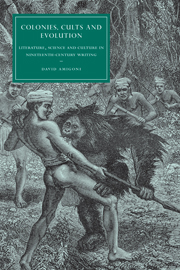Book contents
- Frontmatter
- Contents
- Acknowledgements
- Introduction: literature, science and the hothouse of culture
- 1 ‘Symbolical of more important things’: writing science, religion and colonialism in Coleridge's ‘culture’
- 2 ‘Our origin, what matters it?’: Wordsworth's excursive portmanteau of culture
- 3 Charles Darwin's entanglements with stray colonists: cultivation and the species question
- 4 ‘In one another's being mingle’: biology and the dissemination of ‘culture’ after 1859
- 5 Samuel Butler's symbolic offensives: colonies and mechanical devices in the margins of evolutionary writing
- 6 Edmund Gosse's cultural evolution: sympathetic magic, imitation and contagious literature
- Conclusion: culture's field, culture's vital robe
- Notes
- Bibliography
- Index
- CAMBRIDGE STUDIES IN NINETEENTH-CENTURY LITERATURE AND CULTURE
4 - ‘In one another's being mingle’: biology and the dissemination of ‘culture’ after 1859
Published online by Cambridge University Press: 22 September 2009
- Frontmatter
- Contents
- Acknowledgements
- Introduction: literature, science and the hothouse of culture
- 1 ‘Symbolical of more important things’: writing science, religion and colonialism in Coleridge's ‘culture’
- 2 ‘Our origin, what matters it?’: Wordsworth's excursive portmanteau of culture
- 3 Charles Darwin's entanglements with stray colonists: cultivation and the species question
- 4 ‘In one another's being mingle’: biology and the dissemination of ‘culture’ after 1859
- 5 Samuel Butler's symbolic offensives: colonies and mechanical devices in the margins of evolutionary writing
- 6 Edmund Gosse's cultural evolution: sympathetic magic, imitation and contagious literature
- Conclusion: culture's field, culture's vital robe
- Notes
- Bibliography
- Index
- CAMBRIDGE STUDIES IN NINETEENTH-CENTURY LITERATURE AND CULTURE
Summary
COLONISING WORSHIP: RECEIVING EVOLUTION, RE-READING CULTURE
Robert J. C. Young observed of Matthew Arnold's Culture and Anarchy that ‘it would be difficult to underestimate the importance and influence of this book as a central, indeed, foundational, account of culture for the humanities in Britain and the United States’. But in the decade when Arnold was laying these foundations – in lectures, periodical essays, and eventually a book – there were competing accounts of culture in circulation. The Athenaeum's review of Darwin's Origin observed that the book's reception would take shape in the lecture hall, the divinity hall, the college and the museum. The same could be said for these other discourses of culture; in some cases, the discourse would be shaped in a lecture hall that sought to mimic the authority of both the divinity hall and the museum. Discourses of evolutionary science made important contributions to the formation of these other discourses of culture.
In January 1866, J. Baxter Langley and the Sunday League instituted a series of secular, morally elevating lectures about scientific knowledge under the title ‘Sunday Evenings for the People’. T. H. Huxley delivered the inaugural lecture, the first of what were to become his resonantly titled Lay Sermons (1870). Huxley's lecture, delivered at St Martin's Hall and entitled ‘On the Advisableness of Improving Natural Knowledge’, was introduced with Haydn's Creation being played on the organ.
- Type
- Chapter
- Information
- Colonies, Cults and EvolutionLiterature, Science and Culture in Nineteenth-Century Writing, pp. 104 - 141Publisher: Cambridge University PressPrint publication year: 2007

